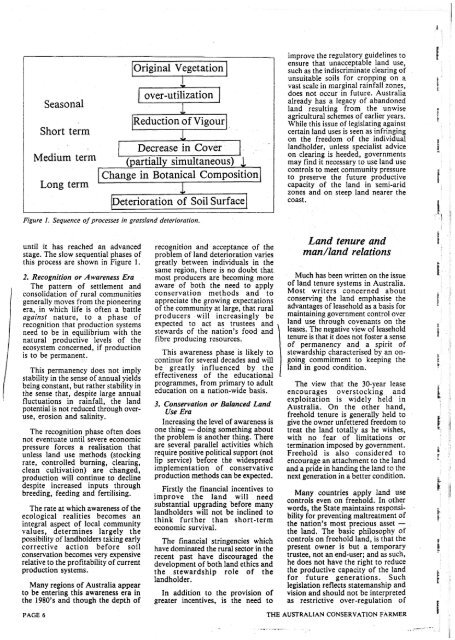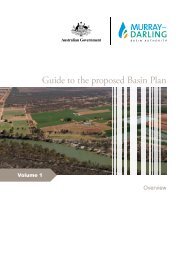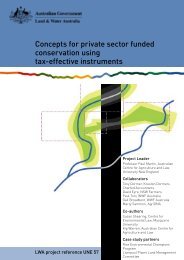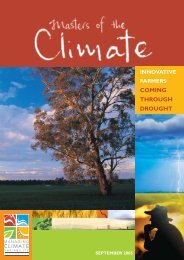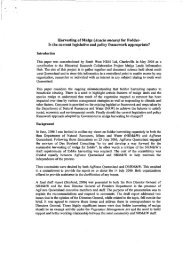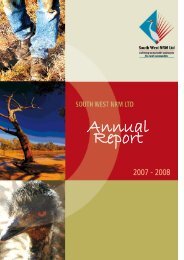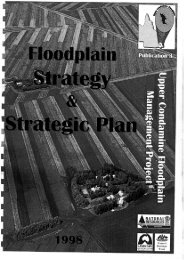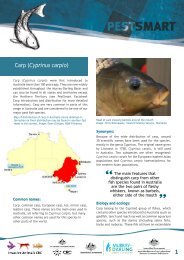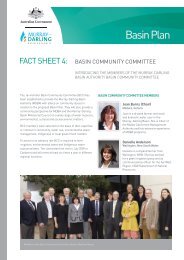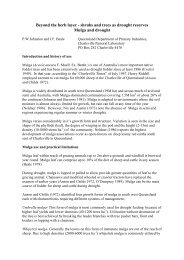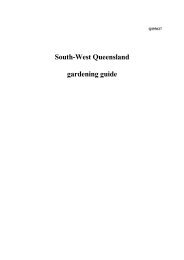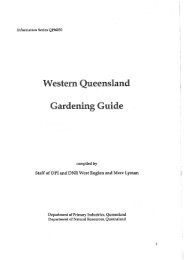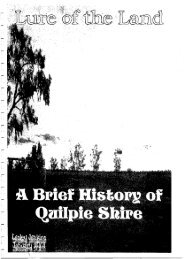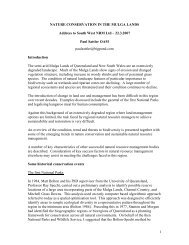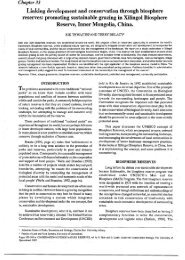soil-conservation-people-religion-and-land.pdf - South West NRM
soil-conservation-people-religion-and-land.pdf - South West NRM
soil-conservation-people-religion-and-land.pdf - South West NRM
Create successful ePaper yourself
Turn your PDF publications into a flip-book with our unique Google optimized e-Paper software.
improve the regulatory guidelines to<br />
ensure that unacceptable l<strong>and</strong> use,<br />
such as the indiscriminate clearing of<br />
unsuitable <strong>soil</strong>s for cropping on a<br />
vast scale in marginal rainfall zones,<br />
does not occur in future. Australia<br />
already has a Iegacy of ab<strong>and</strong>oned<br />
l<strong>and</strong> resulting from the unwise<br />
agricultural schemes of earlier years.<br />
While this issue of legislating against<br />
certain l<strong>and</strong> uses is seen as infringing<br />
on the freedom of the individual<br />
l<strong>and</strong>holder, unless specialist advice<br />
on clearing is heeded, governments<br />
may find it necessary to use l<strong>and</strong> use<br />
controls to meet community pressure<br />
to preserve the future productive<br />
capacity of the l<strong>and</strong> in semi-arid<br />
zones <strong>and</strong> on steep l<strong>and</strong> nearer the<br />
coast.<br />
Figure I. Sequence of processes in grassl<strong>and</strong> deterioration.<br />
until it has reached an advanced<br />
stage. The slow sequential phases of<br />
this process are shown in Figure 1.<br />
2. Recognition or Awareness Era<br />
The pattern of settlement <strong>and</strong><br />
consolidation of rural communities<br />
generally moves from the pioneering<br />
era, in which life is often a battle<br />
against nature, to a phase of<br />
recognition that production systems<br />
need to be in equilibrium with the<br />
natural productive levels of the<br />
ecosystem concerned, if production<br />
is to be permanent.<br />
This permanency does not imply<br />
stability in the sense of annual yields<br />
being constant, but rather stability in<br />
the sense that, despite large annual<br />
fluctuations in rainfall, the l<strong>and</strong><br />
potential is not reduced through overuse,<br />
erosion <strong>and</strong> salinity.<br />
The recognition phase often does<br />
not eventuate until severe economic<br />
pressure forces a realisation that<br />
unless l<strong>and</strong> use methods (stocking<br />
rate, controlled burning, clearing,<br />
clean cultivation) are changed,<br />
production will continue to decline<br />
despite increased inputs through<br />
breeding, feeding <strong>and</strong> fertilising.<br />
The rate at which awareness of the<br />
ecological realities becomes an<br />
integral aspect of local community<br />
values, determines largely the<br />
possibility of l<strong>and</strong>holders taking early<br />
corrective action before <strong>soil</strong><br />
<strong>conservation</strong> becomes very expensive<br />
relative to the profitability of current<br />
production systems.<br />
Many regions of Australia appear<br />
to be entering this awareness era in<br />
the 1980's <strong>and</strong> though the depth of<br />
PAGE 6<br />
Firstly the financial incentives to<br />
improve the l<strong>and</strong> will need<br />
substantial upgrading before many<br />
l<strong>and</strong>holders will not be inclined to<br />
think further than short-term<br />
economic survival.<br />
The financial stringencies which<br />
have dominated the rural sector in the<br />
recent past have discouraged the<br />
development of both l<strong>and</strong> ethics <strong>and</strong><br />
the stewardship role of the<br />
l<strong>and</strong>holder.<br />
In addition to the provision of<br />
greater incentives, is the need to<br />
L<strong>and</strong> tenure <strong>and</strong><br />
man/l<strong>and</strong> relations<br />
recognition <strong>and</strong> acceptance of the<br />
problem of l<strong>and</strong> deterioration varies<br />
greatly between individuals in the<br />
same region, there is no doubt that<br />
most producers are becoming more Much has been written on the issue<br />
aware of both the need to apply of l<strong>and</strong> tenure Systems in Australia.<br />
conservatjon methods <strong>and</strong> to Most writers concerned about<br />
appreciate the growing expectations conserving the l<strong>and</strong> em~hasise the<br />
of the community at large, that rural advantages of leasehold as a basis for<br />
producers will increasingly be maintaininggovernmentcontrolover<br />
expected to act as trustees <strong>and</strong> l<strong>and</strong> use through covenants on the<br />
stewards of the nation's food <strong>and</strong> leases. The negative view of leasehold<br />
fibre producing resources.<br />
tenure is that it does not foster a sense<br />
of permanency <strong>and</strong> a spirit of<br />
This awareness phase is likely to stewardship characterised by an oncontinue<br />
for several decades <strong>and</strong> will going commitment to keeping the<br />
be greatly influenced by the l<strong>and</strong> in good condition.<br />
effectiveness of the educational<br />
programmes, from primary to adult The view that the 30-year lease<br />
education on a nation-wide basis. encourages overstocking <strong>and</strong><br />
exploitaFion is widely Geld in<br />
3. Conservation or Balanced L<strong>and</strong> Australia. On the other h<strong>and</strong>,<br />
Use Era<br />
freehold tenure is generally held to<br />
Increasing the level of awareness is give the owner unfettered freedom to<br />
one thing - doing something about treat the l<strong>and</strong> totally as he wishes,<br />
the problem is another thing. There with no fear of limitations or<br />
are several parallel activities which termination imposed by government.<br />
require positive political support (not Freehold is also considered to<br />
lip service) before the widespread encourage an attachment to the l<strong>and</strong><br />
implementation of conservative <strong>and</strong> a pride in h<strong>and</strong>ing the l<strong>and</strong> to the<br />
production methods can be expected. next generation in a better condition.<br />
Many countries apply l<strong>and</strong> use<br />
controls even on freehold. In other<br />
words, the State .maintains responsibility<br />
for preventing maltreatment of<br />
the nation's most precious asset -<br />
the l<strong>and</strong>. The basic philosophy of<br />
controls on freehold l<strong>and</strong>, is ;hat the<br />
present owner is but a temporary<br />
trustee, not an end-user; <strong>and</strong> as such,<br />
he does not have the right to reduce<br />
the productive capacity of the l<strong>and</strong><br />
for future generations. Such<br />
legislation reflects statemanship <strong>and</strong><br />
vision <strong>and</strong> should not be interpreted<br />
as restrictive over-regulation of<br />
THE AUSTRALIAN CONSERVATION FARMER


